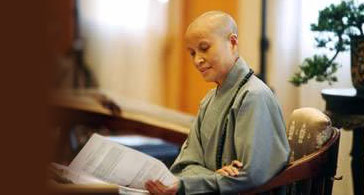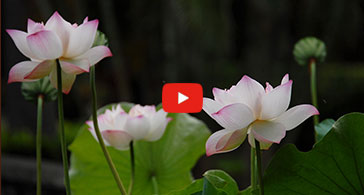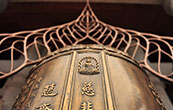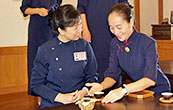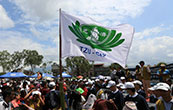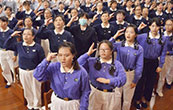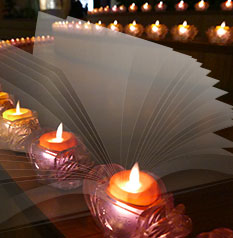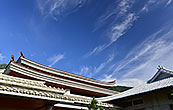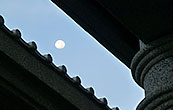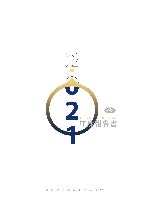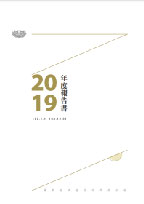眼盲心不盲
2008-04-16 | 紐西蘭翻譯志工
記得當年台東的佛教蓮社是由一間木造倉庫改造而成,處處釘著木柱、支架。有一位盲者每次進來都未曾拿拐杖,而進門後,從不曾碰撞到四處林立的支柱,每當他快碰到柱子時,身體自然會閃開,是以令我感到非常不可思議。
The Buddhist Lotus Bureau in Taidong was reconstructed from a wooden warehouse full of pillars and trestles. A blind man would always come in without a guiding stick, and he never bumped into any of the surrounding pillars. Every time he went near a pillar, his body would naturally dodge away from the hindrance, which amazed me.
有一天,我看到他從外面進來,於是躡腳走到他的旁邊,想試試他的反應,結果他一閃而過,並沒撞著我。我那時的感覺是他能聽出人的呼吸,聽覺真是敏銳;後來又得知,他可以背誦全七卷、十萬字的妙法蓮華經!我曾經在他誦經之時,拿著經文一字字核對,發現他竟然能一字不漏、一字不錯,且經常有許多明眼人向其請教經文、佛法。他並且善奏揚琴、能夠聞聲起樂,諸多的才藝,實在令人歎服;他就是一個「心眼清明」的最好例子。
One day, I saw him come in, so I silently walked to his side to test his reaction. He reacted very quickly and didn’t make contact with me at all. At that point in time, I thought he could hear people’s breaths - what a sensitive hearing he had! Later on I found out that he could memorise the entire Wonderful Lotus Sutra (Saddharmapundarika Sutra) which has seven volumes and a hundred thousand words! I even checked word by word while he was chanting the Sutra and realised that he did not miss any one word, nor did he make any mistakes. Many have consulted him about the meaning of the Sutra, as well as Buddhism in general. He also mastered music and instrument play, and his numerous talents astonished many people; he epitomises how one could preserve a clear eye in the heart.
◎穿針引線見神通
有一次,我到花蓮新城鄉去複查一家感恩戶,這個家庭兩夫婦都是盲人,有四、五個小孩。到達時,他們的屋門未關,所以我就一面走進去,一面小聲地說: 「門未關,大概人在的樣子。」結果馬上聽到裡面回話說:「有人在」。尋聲走進去,發現她坐在床沿,手上正拿著衣服在縫補,我就站在旁邊看她補衣服;適巧此時針上的線用完,她就偏著頭,一手拿針、一手拿線,一次、二次、三次、第三次竟然把線從針眼給穿了過去,實在令人非常佩服。因為她不用肉眼而是用心、用精神的力量,所以雖說針眼是非常的小,雖說她是個眼盲的人,但她照樣可以穿針引線,這種工夫就是所謂的「神通」。
Once, I was doing follow-up visits to Gan-en Households (Tzu Chi beneficiaries) at Hualien’s Xincheng Village. There was one family with 4 or 5 children and parents who were both blind. When I arrived, the door wasn’t shut, so I walked in while murmuring, “The door wasn’t closed, seems like someone is here.” Then I heard a reply instantly from the inside, “We’re here.” Following the voice, I found the blind woman sitting bedside, mending clothes by hand, so I stood by her side and watched her sew. Coincidently, the thread she was sewing with had run out, so she tilted her head to one side, with the needle in one hand and the thread in the other, once, twice, and on the third try she managed to thread the needle! This is very admirable, because she used not her physical eyes, but the power of her heart and spirit. Even though she was blind, she was still able to put the thread through the tiny needle eye. This ability is the so-called supernatural power.
說到神通,佛教也有個故事。
Speaking of supernatural powers, there’s also a story in Buddhism.
阿那律陀是佛陀的堂弟,跟著佛陀出家佛行。每當佛陀開始講經之際,佛聲一出,阿那律陀就開始打瞌睡,而講經結束,他又立刻醒來。如此週而複始,佛陀於是數落他:「如此貪睡,索性去當海底蛤,海底蛤一睡三千年。」
Analutuo, Buddha’s cousin, followed the Buddha in the practise of Buddhism. Every time the Buddha started to give lectures on the Sutras, Analutuo would doze off as soon as the Buddha spoke. But once the lecture had finished, he would immediately wake up. This happened repeatedly, so the Buddha scolded him, “If you want to sleep so much, you might as well go be a clam on the ocean floor. A clam sleeps for three thousand years at a time.”
阿那律陀聽了深感慚愧,回到寮房即發願:「從今起決不睡覺,眼睛不閉,直到開悟為止。」此後,他每天都睜大雙眼,不敢睡覺,忍受不住時,就拿草撐開眼皮,如此經過七天,眼睛未曾合過。盡管佛陀數次前來勸說,他仍然一點也不肯休息,最後他的眼睛便由發紅而失明。
Analutuo felt a deep guilt after he heard the Buddha’s comment. Once he returned to the dorm he made a vow, “I will not sleep from today onwards, and will not close my eyes, until I have become enlightened.” Since then, he kept his eyes wide open everyday and did not dare to sleep. When he couldn’t keep them open any longer, he propped up his eye lids with grass stems, and kept them opened for seven days without rest. Although the Buddha came to him many times and tired to persuade him, he refused to take a rest. At last, his eyes turned red and he lost his eyesight.
佛陀憫其亦誠,慈悲的慰問:「雖然你的眼睛已失明,但你的心是清明的。」並教授他如何修定,以重見光明。澄清靜慮一段時日後,阿那律陀自然成就天眼通,能夠得見天堂及地獄的種種景況,也因此,阿那律陀有「半頭天眼」頭陀之稱。
The Buddha sincerely commiserated for his loss, and compassionately consoled, “Although you have lost your sight, but your heart is still clear.’’ The Buddha taught him how to cultivate calmness, for his return to a bright future. After a period of calm cultivations, Analutuo gained sights to all scenes in heaven and hell. Therefore, Analutuo gained the title as the Buddha of “Half head, heaven eyes”.
◎心眼清勝過肉眼明
A clear heart exceeds bright eyes.
是以,我們平時須讓心休息,「休息」是指平息欲望貪念,不作分別想。眼睛看見了外界的事物,容易讓我們起分別心,分別若多則煩惱亦多,人常說:「不見為淨」,若什麼事物都不去看,我們的心自然就清靜,心清靜則耳根聰、耳根聰則聲不亂、聲不亂則心生智慧,心若生智慧則明曉一切道理,進而減煩惱、息造業。
We need to keep our heart rested. To “rest” means to suppress our cravings, greediness and discriminating thoughts. Discriminating thoughts are easily elicited upon exposure to the external world. As we discriminate matters, conflicts and worries arise. People say, “Out of sight, out of mind.” If we do not bother to see anything, our hearts will naturally be pure and clear. When the heart is pure, we can hear clearly and not be affected by outside noises. When we are not affected by outside noises, wisdom will grow. When wisdom are cultivated in our hearts, all senses and reasons shall come to us, and thus reduce our worries and prevent us from creating bad karma.








